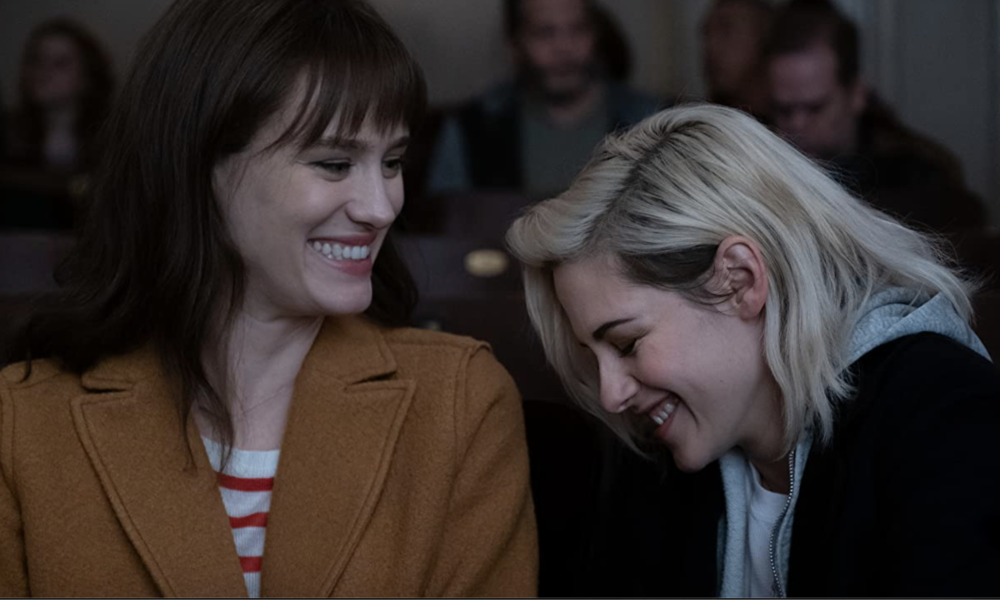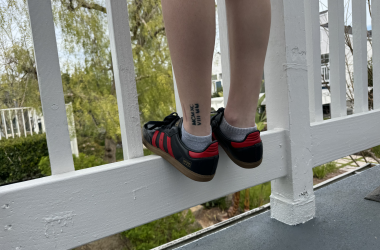The “Happiest Season” is a comedic love story of a young adult bringing home their significant other to introduce to the family over the holidays with a twist – they’re lesbians, and one of them hasn’t come out to her family yet.
Chaos ensues as Abby, played by Kristen Stewart, navigates five days of holiday cheer with her girlfriend Harper, played by Mackenzie Davis, while pretending they are good roommates to Harper’s family and friends.
This movie is attempting to explain the complications of disclosure, and how hard it is to be yourself around a family with strict expectations. However, as I streamed the movie alongside my friend, we groaned at the obvious comedic relief scenes and the cliche archetypes.
Abby, of course, is the most loving girlfriend who is subjected to rounds and rounds of abuse as Harper’s family continually pities the loss of her parents years ago, is accused of stealing while searching for a gift for white elephant, and is forced literally back into the closet for her girlfriend.
Our heroine is uncomplicated and one-dimensional so when she mentions that she’s a doctoral student at Carnegie Mellon studying art history, it’s another detail that feels fabricated alongside her claims that she’s recently single from a heterosexual relationship. There’s no sense that there’s a world in which Abby operates besides revolving around her girlfriend Harper.
Harper is supposedly the subject of our sympathy as she is attempting to dodge her parent’s intentions to set her up with her ex-boyfriend Conner, and trying to affirm her father’s candidacy for mayor while socializing with the local elite establishment. But throughout the movie, I could not but feel a growing resentment towards Harper, who was demanding so much of her girlfriend, Abby, while projecting her own issues onto her.
Harper and her two sisters vie for their parent’s conditional approval to a competitive level in outrageous ways. It feels almost unnecessary for them to be so antagonistic especially since the stakes aren’t set well.
What does it look like when someone in Harper’s community steps out of line? What does this fear and drive to appease their parents come from? I think I could speak much better to these ideas growing up queer in a religious and immigrant household; the sense of debt that is held over your head that your parents sacrificed to give you space in a new country.
Abby and Harper stay together because of course, this is a feel-good holiday movie. For me, the resolution feels contrived and lacking in depth.
It is not to say that couples need to be “out” to their families to be successfully happy, but rather truth is the guiding spirit in all relationships. Harper continually lies to Abby and refuses to stand up for her in the moments that matter the most before she is “outed,” and not by her own choice.
When the movie ends, the characters remain static. Abby, the adoring girlfriend, forgives Harper of all wrongdoings, and Harper realizes in her desperation to be loved and adored by everyone, she can’t lose the one person who prioritizes her the most.
The scenes arrive predictably, but the strongest moment is when Daniel Levy playing John offers Abby insight on the stage Harper might be in her ability to be comfortable in sharing her identity with others. It’s a heartwarming scene where he emphasizes that everyone’s coming out story is different but Harper still loves Abby even if Harper isn’t ready to come out and tell everyone.
All in all, what would have topped this movie off is if Kristen Stewart eloped with Aubrey Plaza, who plays Harper’s other ex, Riley. Riley is the emotional support throughout and I think it’s fair to say I endured the entire movie only to hear Aubrey Plaza’s lines.




